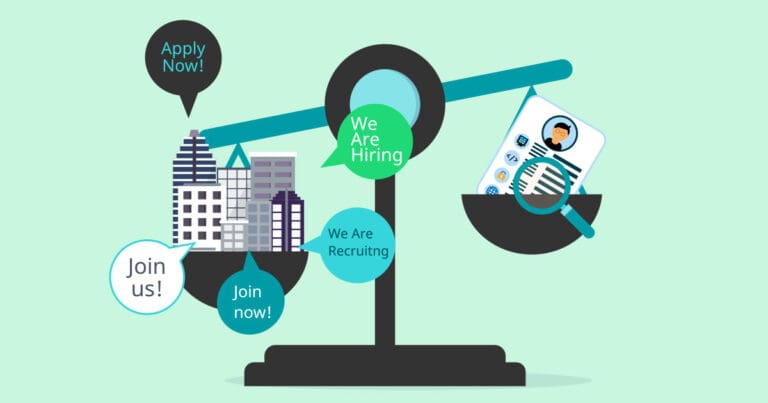12 Common Job Search Difficulties & Mistakes, Plus How to Avoid Them

Once a job seeker hits the job market it’s understandable that they’re eager to find a job as soon as possible.
Unfortunately in the mad dash to the finish line, many job seekers make some common mistakes that can hurt their chances of getting the job they want.
Fortunately, with the right strategies and a solid job-seeking roadmap in place, you can understand the biggest mistakes job seekers make and how to avoid them.
What are the most common job search obstacles?
Some of the most common obstacles and problems job seekers have when search for a job are: impatience, not hearing back from applications, job hunt burnout, and not feeling prepared for interviews.
However, by avoiding the common mistakes made by job seekers, many of these problems can be resolved before they ever become an issue.
12 Common Job Search Mistakes & Difficulties:
- Not having a job search plan
- Not tailoring your resume
- Not leveraging social media in your job search
- Not editing your social media for employers
- Making mistakes in your online job applications
- Only applying for jobs online
- Only applying for jobs you’re 100% qualified for
- Not tapping into your offline networks
- Not asking questions during job interviews
- Not following up on job applications
- Only focusing on jobs in one industry
- Not prepping for job interviews
1. Not having a job search plan
Having a job search plan is key to avoiding many of the common mistakes made by job seekers.
A good job search plan should include your goals, target companies, available positions, a realistic timeline for applying and interviewing, and strategies for networking.
2. Not tailoring your resume
It’s important to tailor your resume to fit each job you apply for. Every job has different requirements, and it’s important that you show the employer why you’re qualified and a perfect fit for their position.
By tailoring your resume, you are showing the employer that you have taken the time to understand the role and showcase how your skills, experience, and education make you the right fit for the job.
3. Not leveraging social media in your job search
Social media can be a powerful tool in your job search. Platforms like LinkedIn are great for connecting with people in your industry, researching potential employers, and staying up to date on trends.
No matter what industry you’re in, having an up-to-date and active professional profile on LinkedIn can help you stand out from the crowd.
4. Not editing your social media for employers
On the flip side of leveraging networks like LinkedIn for your job search, employers will also use your other, less professional social media profiles to do more research on you.
This is why it’s important to clean up any posts or photos that might be deemed inappropriate for a potential employer.
5. Making mistakes in your online job applications
When it comes to online job applications, it’s important that they are filled out correctly. Any typos or inaccurate information can be a red flag for employers and can lead to your application being ignored or discarded.
Be sure to double-check all of the information you provide, and make sure that it is accurate and up to date.
6. Only applying for jobs online
Applying for jobs online is a great way to find job opportunities, but it shouldn’t be the only way. Leveraging your offline networks such as your family, friends, and professional contacts is just as important.
Many times jobs aren’t even advertised publicly, so it’s important to tap into these networks to find out what opportunities are available.
7. Only applying for jobs you’re 100% qualified for
It can be tempting to only apply for jobs that you’re 100% qualified for, but this can limit your chances of getting a job you could potentially thrive in.
Instead, you should apply for jobs that you have most of the necessary skills and qualifications for, as well as those that challenge and stretch your abilities.
8. Not tapping into offline networks
In addition to reaching out to friends, family, and former colleagues, finding online or in-person networking events can help you meet new people and open up new job opportunities.
In-person networking events are especially important to attend, as they allow you to make lasting connections with potential employers or contacts in your industry.
9. Not asking questions during job interviews
Job interviews are a great opportunity for employers to get to know you, but it’s also your chance to get to know the employer. Asking questions during a job interview shows employers that you’re engaged and interested in the position.
Asking questions gives you the opportunity to learn more about the company, the role, and whether or not it’s a good fit for you.
10. Not following up on job applications
Following up can be a great way to show the employer that you’re serious and interested in the job opportunity.
If you haven’t heard back after submitting your application or attending an interview, consider reaching out with a polite and professional follow-up email.
This may help remind the employer of your interest in the position and could potentially result in you receiving an update on the status of your application.
11. Only focusing on jobs in one industry
It’s important to open yourself up to job opportunities in different industries, as this can help you gain valuable experience and knowledge that could benefit you down the road.
By exploring different fields, you may find something that is a better fit for you or discover new professional interests.
12. Not prepping for job interviews
Failing to prepare for job interviews is one of the biggest mistakes job seekers make. If you don’t take the time to research the company and practice interviewing, you could end up missing out on a great opportunity.
No matter how many interviews you’ve been on or how “easy” you find interviewing, take some time before your interview to do your research, practice common questions, and think about how you can demonstrate your knowledge and skills.
Avoiding the biggest mistakes job seekers make
At the end of the day, job seekers should be aware of the biggest mistakes they make and take steps to avoid them.
Take time to accurately fill out your applications, leverage both online and offline job networks, apply for jobs you’re qualified for as well as those that challenge and stretch you, attend networking events, ask questions during interviews, follow up on job applications, explore different industries, and — ALWAYS — prepare for job interviews.
By doing these things, you’ll be well on your way to a successful job search.
Looking for your next gig? Let us help.
Every year, Mondo helps over 2,000 candidates find jobs they love.
More articles about job searching and industry trends:
- What’s the Best & Worst Time of Year to Find a Job?
- How to Best Explain Having a ‘Gap’ on Your Resume
- Top 7 Industries Hiring Digital Marketing Jobs
- Best Remote STEM Jobs, with Salary Ranges
- Cliche Interview Answers to Avoid & What to Say Instead
- 7 Things to Never Say to a Recruiter When Looking for a Job
- The 9 Workplace Soft Skills Most Valued By Employers
- Best Questions to Ask to Impress Hiring Managers



